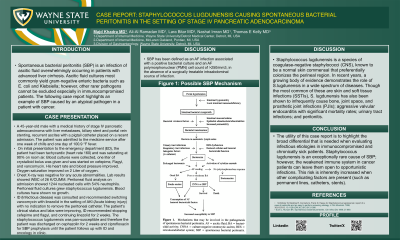Sunday Poster Session
Category: Biliary/Pancreas
P0086 - Case Report: Staphylococcus lugdunensis Causing Spontaneous Bacterial Peritonitis in the Setting of Stage IV Pancreatic Adenocarcinoma
Sunday, October 27, 2024
3:30 PM - 7:00 PM ET
Location: Exhibit Hall E

Has Audio

Majd Khadra, MD
Detroit Medical Center/Wayne State University
Detroit, MI
Presenting Author(s)
Majd Khadra, MD1, Ali Al-Ramadan, MD1, Lara Bitar, MD2, Nashat Imran, MD1, Thomas Kelly, MD3
1Detroit Medical Center/Wayne State University, Detroit, MI; 2McLaren Oakland Hospital, Pontiac, MI; 3Wayne State University, Detroit, MI
Introduction: Spontaneous bacterial peritonitis (SBP) is an infection of ascitic fluid overwhelmingly occurring in patients with advanced liver cirrhosis. Ascitic fluid cultures most commonly yield gram-negative enteric bacteria such as E. coli and Klebsiella; however, other rarer pathogens cannot be excluded especially in immunocompromised patients. The following case report highlights an example of SBP caused by an atypical pathogen in a patient with cancer.
Case Description/Methods: A 45-year-old male with a medical history of stage IV pancreatic adenocarcinoma with liver metastases, biliary stent and portal vein stenting, recurrent ascites with a pigtail catheter placed on a recent admission. The patient was admitted to the medicine service after one week of chills and one day of 100.9 °F fever. On initial presentation to the emergency department (ED), the patient had been tachycardic (heart rate 160) and was saturating at 90% on room air. Blood cultures were collected, one liter of crystalloid bolus was given and was started on cefepime, Flagyl, and vancomycin. His heart rate and blood pressure improved. Oxygen saturation improved on 2 Liter of oxygen. Chest X-ray was negative for any acute abnormalities. Lab results showed WBC of 26 K/CUMM. Peritoneal fluid analysis on admission showed 1244 nucleated cells with 54% neutrophils. Peritoneal fluid cultures grew staphylococcus lugdunensis. Blood cultures have shown no growth. ID (Infectious disease) was consulted and recommended switching vancomycin with linezolid in the setting of AKI (Acute kidney injury) with no indication to remove the peritoneal catheter. The patient’s clinical status and labs were improving, ID recommended stopping cefepime and flagyl, and continuing linezolid for 2 weeks. The staphylococcus lugdunensis was pan-susceptible and therefore the patient was discharged on cephazolin for 2 weeks and ciprofloxacin for SBP prophylaxis until the patient follows up with ID and oncology in clinic.
Discussion: The utility of this case report is to highlight the broad differential that is needed when evaluating infectious etiologies in immunocompromised and chronically sick patients. Staphylococcus lugdunensis is an exceptionally rare cause of SBP; however, the weakened immune system in cancer patients can leave them open to opportunistic infections. This risk is inherently increased when other complicating factors are present (such as permanent lines or tubes).
Disclosures:
Majd Khadra, MD1, Ali Al-Ramadan, MD1, Lara Bitar, MD2, Nashat Imran, MD1, Thomas Kelly, MD3. P0086 - Case Report: <i>Staphylococcus lugdunensis</i> Causing Spontaneous Bacterial Peritonitis in the Setting of Stage IV Pancreatic Adenocarcinoma, ACG 2024 Annual Scientific Meeting Abstracts. Philadelphia, PA: American College of Gastroenterology.
1Detroit Medical Center/Wayne State University, Detroit, MI; 2McLaren Oakland Hospital, Pontiac, MI; 3Wayne State University, Detroit, MI
Introduction: Spontaneous bacterial peritonitis (SBP) is an infection of ascitic fluid overwhelmingly occurring in patients with advanced liver cirrhosis. Ascitic fluid cultures most commonly yield gram-negative enteric bacteria such as E. coli and Klebsiella; however, other rarer pathogens cannot be excluded especially in immunocompromised patients. The following case report highlights an example of SBP caused by an atypical pathogen in a patient with cancer.
Case Description/Methods: A 45-year-old male with a medical history of stage IV pancreatic adenocarcinoma with liver metastases, biliary stent and portal vein stenting, recurrent ascites with a pigtail catheter placed on a recent admission. The patient was admitted to the medicine service after one week of chills and one day of 100.9 °F fever. On initial presentation to the emergency department (ED), the patient had been tachycardic (heart rate 160) and was saturating at 90% on room air. Blood cultures were collected, one liter of crystalloid bolus was given and was started on cefepime, Flagyl, and vancomycin. His heart rate and blood pressure improved. Oxygen saturation improved on 2 Liter of oxygen. Chest X-ray was negative for any acute abnormalities. Lab results showed WBC of 26 K/CUMM. Peritoneal fluid analysis on admission showed 1244 nucleated cells with 54% neutrophils. Peritoneal fluid cultures grew staphylococcus lugdunensis. Blood cultures have shown no growth. ID (Infectious disease) was consulted and recommended switching vancomycin with linezolid in the setting of AKI (Acute kidney injury) with no indication to remove the peritoneal catheter. The patient’s clinical status and labs were improving, ID recommended stopping cefepime and flagyl, and continuing linezolid for 2 weeks. The staphylococcus lugdunensis was pan-susceptible and therefore the patient was discharged on cephazolin for 2 weeks and ciprofloxacin for SBP prophylaxis until the patient follows up with ID and oncology in clinic.
Discussion: The utility of this case report is to highlight the broad differential that is needed when evaluating infectious etiologies in immunocompromised and chronically sick patients. Staphylococcus lugdunensis is an exceptionally rare cause of SBP; however, the weakened immune system in cancer patients can leave them open to opportunistic infections. This risk is inherently increased when other complicating factors are present (such as permanent lines or tubes).
Disclosures:
Majd Khadra indicated no relevant financial relationships.
Ali Al-Ramadan indicated no relevant financial relationships.
Lara Bitar indicated no relevant financial relationships.
Nashat Imran indicated no relevant financial relationships.
Thomas Kelly indicated no relevant financial relationships.
Majd Khadra, MD1, Ali Al-Ramadan, MD1, Lara Bitar, MD2, Nashat Imran, MD1, Thomas Kelly, MD3. P0086 - Case Report: <i>Staphylococcus lugdunensis</i> Causing Spontaneous Bacterial Peritonitis in the Setting of Stage IV Pancreatic Adenocarcinoma, ACG 2024 Annual Scientific Meeting Abstracts. Philadelphia, PA: American College of Gastroenterology.
